The Legault government has not said everything about the role played by the consultants, paid $35,000 a day.
On December 14, 2020, when the very first vaccines had just been injected into Quebecers , the director of the vaccination campaign Daniel Paré received an email from an associate of the consulting firm McKinsey: “Bravo for this first day which is taking place good. Here are my notes on follow-ups (action, responsible, deadlines). Feel free to make changes. »
Behind the scenes, McKinsey played a central role in the game plan for the vaccination campaign in Quebec, drawing on its experience with other states, reveals a Radio-Canada investigation. But the American consultancy did more than that.
In May 2020, the Legault government had rejected a request from the opposition parties to make public the transmission of all the opinions and documents produced by the firm
.
Radio-Canada was able to reconstruct more precisely the role played by McKinsey through more than 200 emails, contracts and working documents. Some of these elements were obtained from sources, others through access to information requests.
The confidential documents that we obtained show that private consultants contributed to crucial decisions during the pandemic by giving advice to the Legault government, in particular for the communication strategy. They developed scenarios for purchasing protective equipment and worked on the PCR testing strategy. They also proposed solutions to remedy the shortage of personnel in CHSLDs.
The private firm coordinated the decision-making teams and summoned the senior officials it wanted(New window), in group meetings as in individual meetings(New window). We even see a McKinsey associate familiar with the secretary general of the government(New window), Yves Ouellet, the highest civil servant of the Quebec State.
$35,000 per day
McKinsey advice was billed in Quebec for $215,000 per week(New window), plus taxes, i.e. $35,000 per day, for the period from April to June 2020. In December, another invoice(New window)for a week of work gives a total of $247,196, or still $35,000 daily.
In total, the government disbursed $1.7 million,(New window)officially for McKinsey to help prepare its deconfinement plan, and 4.9 million(New window)to support it in the economic recovery plan.
The consulting firm piloted committees, organized strategic meetings, distributed roles on working groups… It also had access to confidential information, show the emails and documents obtained.
To these documents are added interviews with three people in public health who had to work with the firm during the pandemic. We were also able to count on the collaboration of two people who actively prepared the vaccination in Quebec. All are subject to confidentiality agreements with their employer. That’s why we agreed to protect their identity.
The use of McKinsey arouses the discomfort of a union of civil servants who accuses the government of having turned its back on internal expertise. The presence of the advisers also irritated members of public health who collaborated with the firm. The government, as well as certain management experts consulted, believe, however, that the exceptional nature of the crisis justified it.
The 10,000 beneficiary attendants, an idea inspired by McKinsey?
The consulting firm has worked closely with the government on the issue of health human resources. On May 26, 2020, McKinsey sends a document for discussion(New window)entitled Levers for dealing with HR issues in CHSLDs
. The objective is to find solutions to remedy the shortage of personnel.
Among the ideas mentioned, we find that of creating [des] training programs accelerated and free of charge […] to reduce the training time before deployment in CHSLD
. The next day, May 27, Legault announced that he wanted to recruit 10,000 beneficiary attendants in three months.
We identified the presence of 10 different McKinsey consultants who worked closely with senior Quebec officials in 2020.
Who is McKinsey?
The American firm is a consulting firm with 130 offices in 65 countries(New window)and bringing together 30,000 consultants.
During the pandemic, her clients were governments (United States, France, Germany, United Kingdom, Mexico, Ontario, etc.), companies from all economic sectors, particularly pharmaceuticals, and international organizations (World Health Organization , Bill and Melinda Gates Foundation…).
According to a report by the French Senate(New window), McKinsey had Pfizer as a client during the pandemic. At the start of the vaccination campaign, Pfizer is the only authorized vaccine supplier in Canada.
On November 25, McKinsey wrote to Jérôme Gagnon, an assistant deputy minister who had just been given internal responsibility for the vaccination campaign. The consultant writes: The planning work has begun on several work sites […] We have no advance, even a little delay if we wish to be ready for a massive vaccination and if we do not go through our usual distribution process.
McKinsey proposes to him to strengthen the governance structure
and details the whole process to launch the vaccination campaign, based on a game plan around seven key dimensions
, a concept found in several of McKinsey’s writings.(New window).
The next day, November 26, François Legault presents to the public Jérôme Gagnon, his general
responsible for vaccination.
In an end-of-term memorandum, McKinsey explains that it helped the government improve its vaccination strategy and plan in light of best practices in the field
.
The firm adds that it has assessed the level of progress of vaccination preparation
and has identified pending decisions regarding planning
. It also reviewed the proposed governance structure/pace
.
In this context, our mandate was to outline the plan created by the government, without however drafting it, specifies the firm. This responsibility was that of the competent authorities.
Recommendations about Pfizer
Emails show advice from the firm about Pfizer. In November, McKinsey recommends reaching an agreement with the manufacturer Pfizer
regarding distribution locations.
In a December email, a consultant encourages the new head of immunization, Daniel Paré, to discuss transportation issues with Pfizer. The firm explains to the director of the vaccination campaign the operation of the delivery of refrigerated vials in order to administer them in CHSLDs.
In mid-December, the consultant proposed to Horacio Arruda and Richard Massé, the right arm of the national director of public health, to make a recommendation to the minister on the importance of having a substantive discussion with Pfizer regarding the need for keep the 2nd dose
.
Quebec agrees not to know other McKinsey clients
Like other consulting firms, McKinsey works simultaneously for several public and private clients whose interests may be divergent. The firm recognizes this itself in its agreement with Quebec.
McKinsey has happened to represent both a drug supplier and the public authority that licenses that drug at the same time, as revealed by The New York Times .(New window).
The April 2 contract with Quebec indicates that the service provider [the firm] undertakes to avoid any situation that would put his personal interest in conflict with the interest of the minister [here, the Prime Minister]
.
At the same time, the firm obtained an addendum (modification) to the contract, on April 6, which indicates, in particular, that it does not disclose to the Government of Quebec who its other customers are .(New window).
“ McKinsey may not inform or consult Client that McKinsey is performing assignments for Client’s competitors or other parties. »
According to the Executive Council, the agreement clearly marked out the risk of conflict of interest. In the event of default, the contracts provide for the measures required to remedy the situation or their termination
, said MCE spokesperson Marie-Ève Fillion.
The outsourcing
of crisis management to McKinsey is controversial in France
McKinsey’s role has been the subject of much controversy .(New window)during the last French presidential elections, following a commission of inquiry into the influence of consulting firms on public policy(New window), held by the Senate.
After four months of investigation, the senators concluded(New window)that entire sections of crisis management [had been] outsourced to consulting firms
and that in France, McKinsey was the keystone of the vaccine campaign
.
The report mentions that McKinsey is hosting Public Health Officers Day
. According to the French senators, the practice is actually common in the consulting sector: consultants can work in an “integrated team” with their clients and are then almost assimilated to public officials
.
“ The intervention of consultants must remain discreet: during the health crisis, McKinsey indicates that it will remain “ behind the scene ”, in agreement with the ministry. The firm does not use its own logo to write its deliverables, but that of the administration. »
The same thing happened in Quebec. We got our hands on several working documents produced by McKinsey that bore the logo of the Government of Quebec and the indication “Your government”(New window).
In their report, the French senators propose prohibiting consultants from using public administration logos and requiring them to declare their interest.
The Ministry of Health does not disclose its collaboration with McKinsey
On July 11, 2022, the following access to information request was sent to the Quebec Ministry of Health and Social Services (MSSS): I would like to know what recommendations from the McKinsey firm you received.
Response from the MSSS: Our research during the processing of your request did not identify any document held by the ministry on this subject.
However, we have counted at least four working documents received by the ministry from McKinsey, not counting the many emails.
In a message dated April 29, 2020, the State Administrator at the Ministry of Health [now Deputy Minister] Dominique Savoie asks the Ministry of the Executive Council ( MCE), the Prime Minister’s ministry, to be able to benefit from the support of McKinsey(New window).
“ As part of our long-term PPE needs planning work, I would like McKinsey to support us in establishing scenarios that would allow us to aim for a good level of reserves and modulation for the next two years in our purchases and stocks for our priority equipment (masks and gowns). »
The case was quickly heard, since on May 4, a committee formed by McKinsey and Dominique Savoie
appeared in order to develop scenarios to define the right level of purchases and inventories for the next two years
.
The MSSS confirms having participated in meetings in the presence of the firm McKinsey
, but did not want to say more. He sent us back to the MCE.
The INSPQ was unaware that its executives had collaborated with McKinsey
The National Institute of Public Health of Quebec told us twice that it had no collaboration with McKinsey. When we showed evidence in emails(New window), the INSPQ has finally confirmed that its Vice-President for Scientific Affairs, Jocelyne Sauvé, did take part in meetings
with the firm, but the Institute claims that nothing came of it.
Officially, McKinsey’s mandate was to put in place a methodology to operationalize decisions surrounding the lifting of COVID-19 pandemic slowdown measures
, says MCE. She was also involved in the development and validation of deconfinement scenarios for the various sectors of economic and social activity.
The private firm had access to confidential government information
When the consultants begin one of their mandates, they ask for access to a quantity of information. We see it in an email from November 23, 2020(New window), addressed to assistant deputy ministers. To undertake its work to improve the vaccine preparedness plan
, McKinsey is requesting access to the ordering process, logistics, transportation and warehousing.
This is clearly indicated in the addendum (modification) to the contract(New window)that binds Quebec and the firm. It reads that the government undertakes to make available to McKinsey the data, information and personnel necessary for the performance of the tasks or responsibilities which, if need be, devolved to it
.
It is also written that Quebec will share confidential information
with the firm. For example, the human resources of the Ministry of Health revealed to the consultants ” the specific issues and challenges that led to the lack of manpower(New window) “, thus sharing information on the vulnerability of the government.
Several emails indicate the presence of data and artificial intelligence specialists from McKinsey in the exchanges with the government. What data did the firm have access to? She can’t answer because it’s confidential.
The contract indicates, however, that the firm is committed to restricting access to government information only to persons who must have access to it for the purposes of carrying out this contract
.
Why use McKinsey?
The day the Department of the Executive Council, that of the Prime Minister, signs an emergency contract, over the counter(New window)(therefore without a call for tenders), with McKinsey, the situation is very difficult in Quebec on the front of COVID-19. As of April 2, 2020, the province has only two million intervention masks, which is insufficient to last four days .
To get supplies, it plays hard. Wealthier countries are buying up the shipments of masks on the tarmac of Chinese airports and Canada is a victim . Prime Minister Legault even admits that representatives of his government are walking around with suitcases of tickets to buy equipment.
Everyone was overwhelmed, in a state of stress
, says a public health source to explain the use of McKinsey. There was so much to organize
, adds another source to public health. Everything had to be done very quickly.
Invited to react to our investigation, the Ministry of the Executive Council justifies the use of McKinsey by the exceptional situation
of COVID-19.
” In order to ensure the best possible management of this crisis and to limit its impact on the population and businesses as much as possible, the Government of Quebec needed an external perspective and the precise and experienced expertise of a whole team at McKinsey. »
The Prime Minister’s Department adds that McKinsey had these skills in its team
.
Last April, Minister Christian Dubé praised the invaluable help
provided by McKinsey, without giving details.
When Radio-Canada interviewed McKinsey in June 2022, the firm replied: We are proud to have worked with Quebec officials by providing them with essential, fact-based information they needed (at this time) to make the best decisions on crucial public health issues, in the interest of all Quebecers.
As part of this investigation, the consultancy declined to comment further. We must respect our confidentiality agreements
, explains McKinsey’s senior partner in Montreal, Éric Gaudet.
Malaise in the public service
A public health source acknowledges that there was a lack of human resources to act on the vaccination front
and that McKinsey filled this gap. But there are people who were irritated by his presence
, there was discontent
, she adds.
It is the disempowerment of the State, believes a second source. I don’t understand why they were there.
“ These were not public health consultants, but organizational people. »
They arrived with proposals and consulted us
, says this source. The experts were consulted, but they were the ones who organised. They were testing us.
She adds: It’s as if we were summoned, we had documents to discuss.
The interim president of the Union of Professionals of the Government of Quebec (SPGQ) Lydia Martel is flabbergasted
by our revelations. We have people who have great expertise in management
, including crisis management, she said.
I find it hard to understand why the internal skills were not called upon to play this role of coordination, of high-level management
, she adds.
“ [In the government], we are convinced that we are not good people who cannot find good formulas and good ways of doing things to apply. »
The president of the union does not see any harm
in an external firm bringing in models that have proven themselves elsewhere, but she thinks that this recourse to consulting firms must be limited to specific skills that we do not have in internal
.
In June 2020, the government had already explained to Radio-Canada that McKinsey’s services were complementary to the expertise of state employees
and were inspired by the experiences of other countries.
The consultancy said its work on COVID-19 was intended to support, not replace, decision-making by government authorities
and that McKinsey has relevant expertise and experience in handling health issues. public
.
Shared experts
According to lawyer Patric Besner, vice-president of the Institute for the governance of private and public organizations (IGOPP), external help was perhaps necessary to coordinate the work of several ministries on the same crisis management. I don’t see any problem in principle, given the magnitude of the situation and seeing that resources were very limited internally.
Benoit Duguay, full professor at UQAM’s School of Management Sciences, is bowled over by
McKinsey’s accomplishments during his tenure. It’s not the kind of role I’m used to seeing in a consulting firm.
“ You have to make a distinction between the internal and the external in a government. How come a consulting firm is in such a close relationship? »
The expert admits that the government apparatus is very heavy
: Maybe it was to go faster, because we were overwhelmed by events, because the pandemic was horrible
and maybe it was the right one thing to do
.
On the other hand, Benoit Duguay criticizes the government for having lacked transparency regarding the role played by McKinsey: If they came to help us and if we owe them a big debt, then tell us what they did, that we’re going to thank them.
“ If we need advisers to coordinate the action of different ministries, help. I don’t know if we have that expertise, but we should have it. We should be able to handle a crisis [without the help of consultants]. »
A doctor among McKinsey associates
In an email from November 23, 2020, we see a new McKinsey associate, whose profile sets her apart from her colleagues. This is a Quebec emergency physician associated with a McKinsey office in the United States.
On December 10, one of McKinsey’s emails indicates that at the same time, this consultant from the firm is working with several states in their vaccination strategy
.
Communication advice
The Executive Council told Radio-Canada that McKinsey had no responsibility for government communications
. However, in the emails, we see that the firm is present in the working group that prepares the “communication strategy”.
In a message from April 22, 2020, a consultant presents a plan worked with public health and the MCEwhose objective is to maintain confidence in the government and public health
and to maintain the follow-up of the rules by the population
.
It is about the importance of press briefings and the complicity [between] Dr. Arruda, Mr. Legault and Ms. McCann
.
The plan also refers to the need for specific communication about children and the return to school and child care
. The email suggests involving other influential health actors
, giving the example of paediatricians, to say that resuming school is possible
.
Later the same day, François Legault announces to Quebecers that a plan will soon be presented for a gradual return to class.
In a working document provided by the firm to the government, we also read that McKinsey supported [the] narrative of the first communications surrounding the reopening of the various sectors (example: public health criterion as being essential)
.
On May 14, 2020, McKinsey is planning a strategic
meeting with various public health executives, including Horacio Arruda. In anticipation, she gives them a document on the use of face coverings around the world(New window)(countries that require it or not), always flanked by the logo of the Government of Quebec.
The firm’s consultant announces in the email the three questions to be discussed during the meeting
. Among these, she asks them: Should the government provide support to citizens to facilitate access to face coverings? (for example: distribution at the entrance to public transport, etc.)
The next day, May 15, François Legault announced the donation of one million masks to Montreal and money for transport companies to distribute masks.
McKinsey contributed to PCR testing rollout strategy
The government needed help determining the capacity of the health system to test the population. McKinsey estimated the number of tests required and recommended purchasing additional machines. The firm also claims to have accomplished the development of the first milestones of the testing
strategy , in a document submitted to the government.
In a May 4 email signed by McKinsey, it reads: Testing – Develop testing strategy (prioritization of testing between different population groups) Richard Massé in collaboration with McKinsey – IN PROGRESS
.
And another: Estimate the amount of testing required for the endorsed testing
strategy (McKinsey in collaboration with Jocelyne Sauvé [INSPQ] and modeling team)
.
The firm also produces a report of everything that is done elsewhere in the world(New window)in terms of testing. She submits this document on May 11(New window)
On May 13, François Legault uses this information in a press conference to show that Quebec is doing better than countries like Germany or the United States in terms of tests per million inhabitants.
Our investigation shows that between April and June 2020, McKinsey also collaborated with other ministries and organizations, such as the Ministry of Labour, Employment and Social Solidarity, the Ministry of Public Security, the CNESST and the Quebec Secretariat for Canadian Relations.
The emails consulted do not show direct links with the Ministry of Education. However, McKinsey writes in a working paper that it has highlighted issues relating to the reopening of CPEs and primary schools (for example: protective measures and student-teacher ratios)
.
McKinsey associate in Culture Minister’s meeting with museums
On April 29, 2020, the Minister of Culture Nathalie Roy is organizing a telephone meeting(New window)with 14 representatives of museums and art galleries in Quebec about the revival of this sector. His diary indicates that Julien Truchon-Poliard(New window),manager commitment
at McKinsey, is also present on the line, along with a public health representative.
The McKinsey firm was mandated by the Quebec government to provide management advice during the health crisis
, explains the department’s communications department. Mr. Truchon-Poliard is the resource of the firm which has been assigned to the Ministry of Culture and Communications. That’s why he was invited to the meeting.
McKinsey contributed to Quebec’s economic recovery plan
In July 2021, the Ministère de l’Économie et de l’Innovation entered into a $4.9 million over-the-counter contract(New window)with McKinsey to help it plan Quebec’s economic recovery and choose the projects to prioritize.
In the special decree, we can read that specialized advisory services, in the context of the global pandemic of COVID-19, are necessary for successful economic recovery
.
This work aimed to allow the government to put in place the conditions to accelerate the growth of the Quebec economy in order to reduce the wealth gap with the United States and Ontario
, explains the spokesperson for the MCE, Marie-Eve Fillion.
It adds that, to do this, it wanted to obtain an external perspective, complementary to its own data, to better assess the impact of all its economic measures and the programs it had put in place
.
Ontario did the same and it displeased the Auditor General
While Quebec signed a $1.7 million contract with McKinsey on April 2, 2020, Ontario signed a contract the next day with the same firm for $1.6 million .
The objective was to develop an organizational structure of intervention
to respond to the crisis. A few months later, Doug Ford’s government added $3.2 million to the same firm to help with COVID-19 recovery planning and strategy preparation. reopening for education
.
In a report published in November 2020(New window), Ontario’s Auditor General (AG) criticizes the province for responding to the crisis by hiring an outside consultant to create a governance structure
.
The VG says the cost of the consultant was above standard industry rates
.
According to the National Post(New window), the use of consultants of all kinds should represent expenditures of more than $17 billion in 2022 compared to $8.3 billion in 2016 for the Canadian government.
In France, the senators’ report concludes that there is a sprawling phenomenon
and a massive use
of these consultants, which raises questions about the proper use of public funds
and our vision of the State and its sovereignty in the face of private firms.
.
The use of consultants is now a reflex: they are called upon for their expertise (even when the State already has in-house skills) and their ability to bring an outside perspective to the administration.
“ A relationship of dependency can develop between the administration and its consultants. […] Consulting firms organize dependence on them. »
When McKinsey knocks again at the government’s door
On July 20, 2020, when the firm’s mandate had ended for almost two months, McKinsey attempted an approach with an executive from François Legault’s ministry.
Is the COVID-19 management structure evolving to your liking?
the consulting firm representative asks in the email(New window). Don’t hesitate if we can help with anything.
And he informs him that several jurisdictions in North America are currently thinking about modernizing the state and preparing for future pandemics
.
Quebec will call on the firm’s services again four months later, then again a year later.
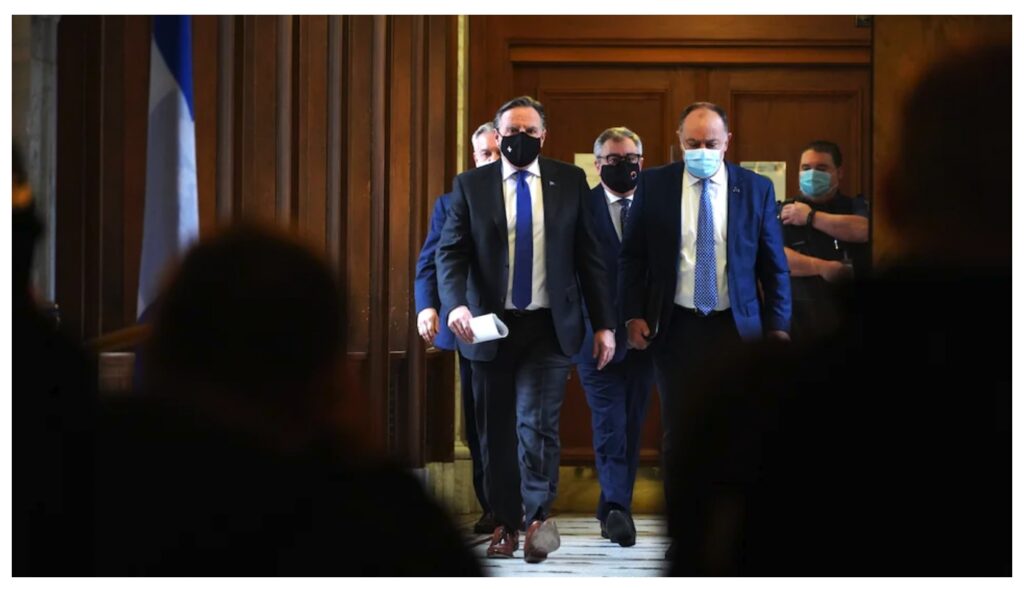

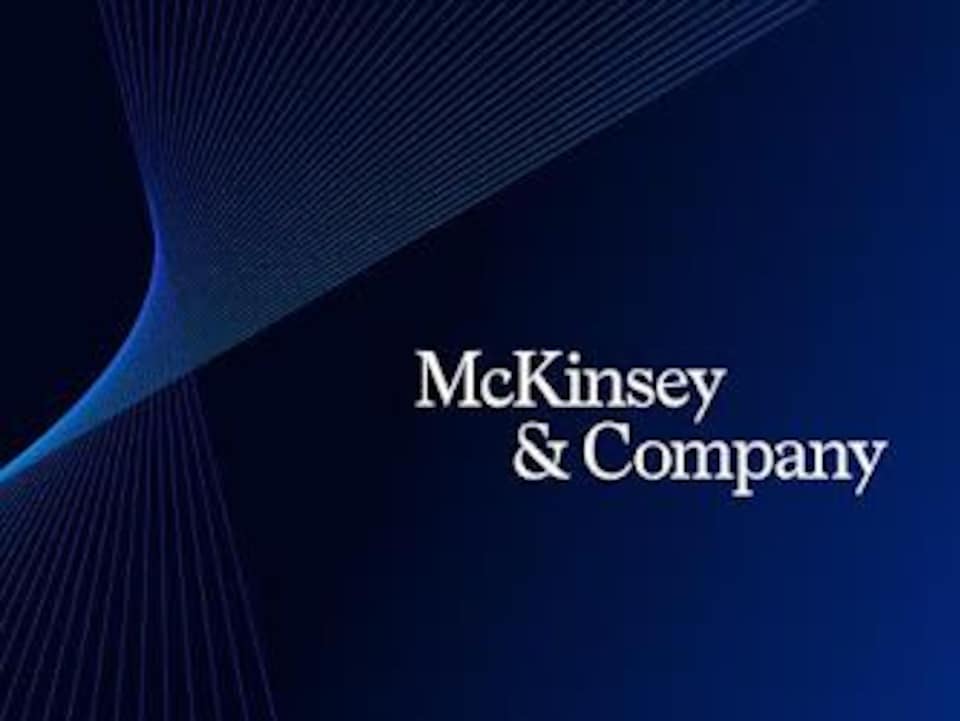
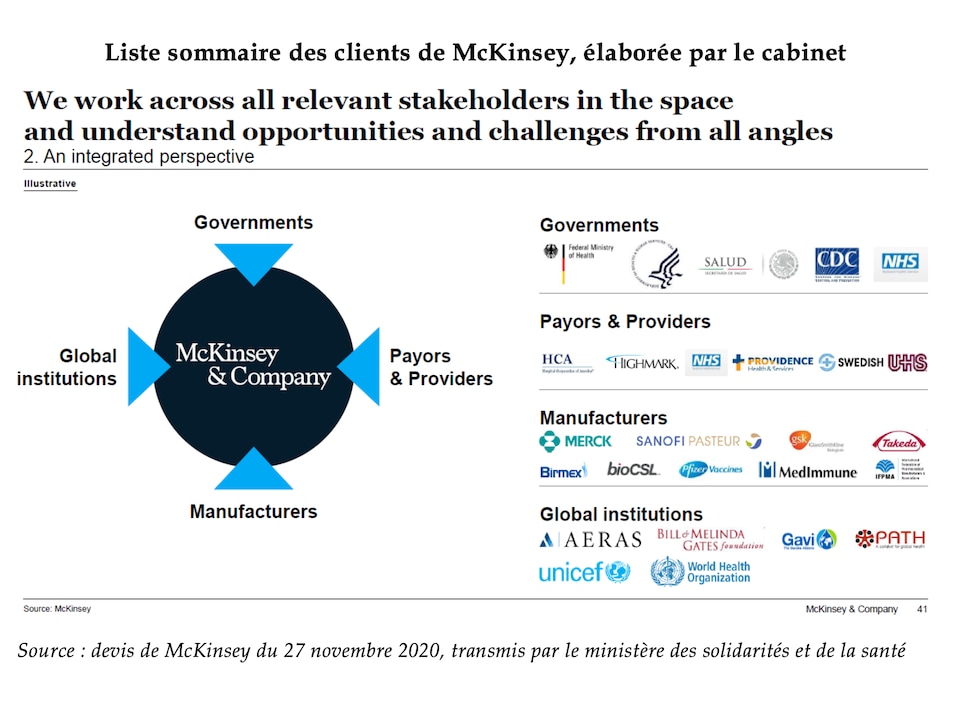
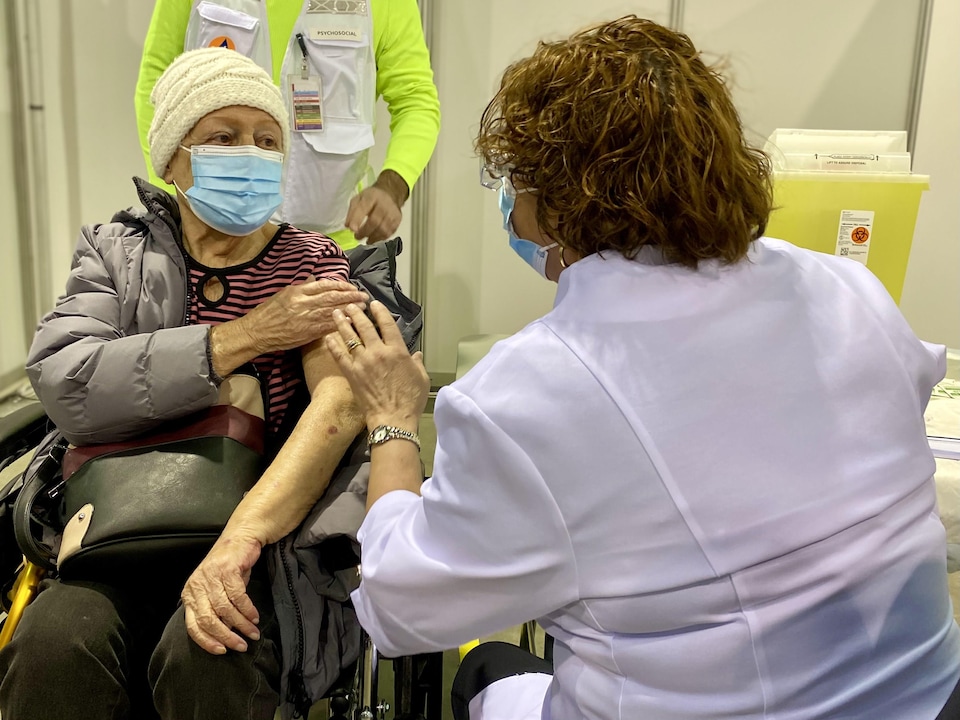
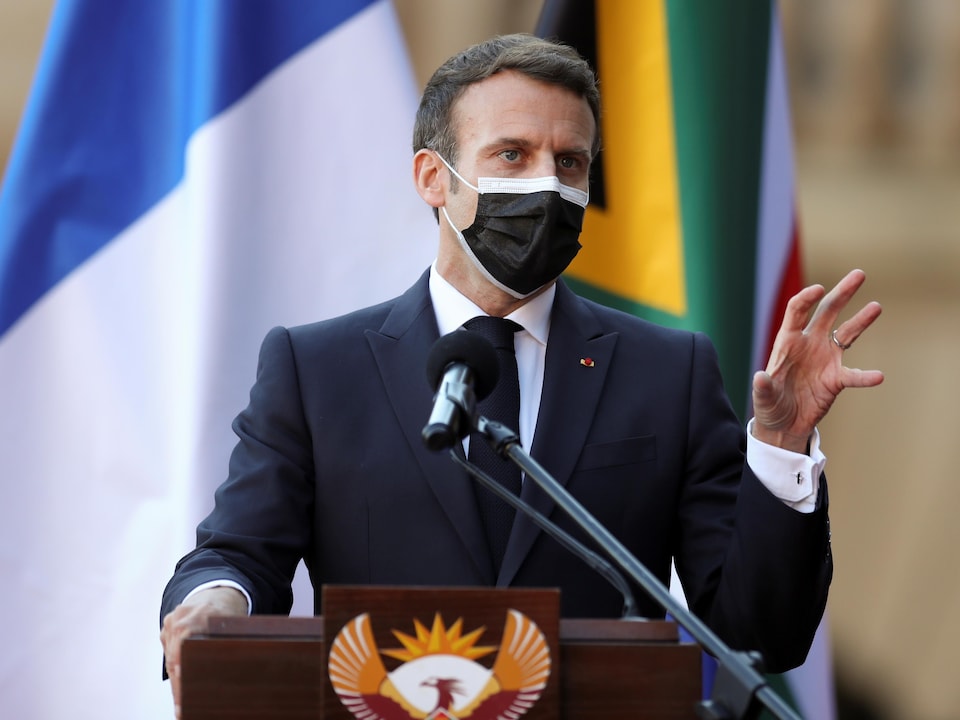
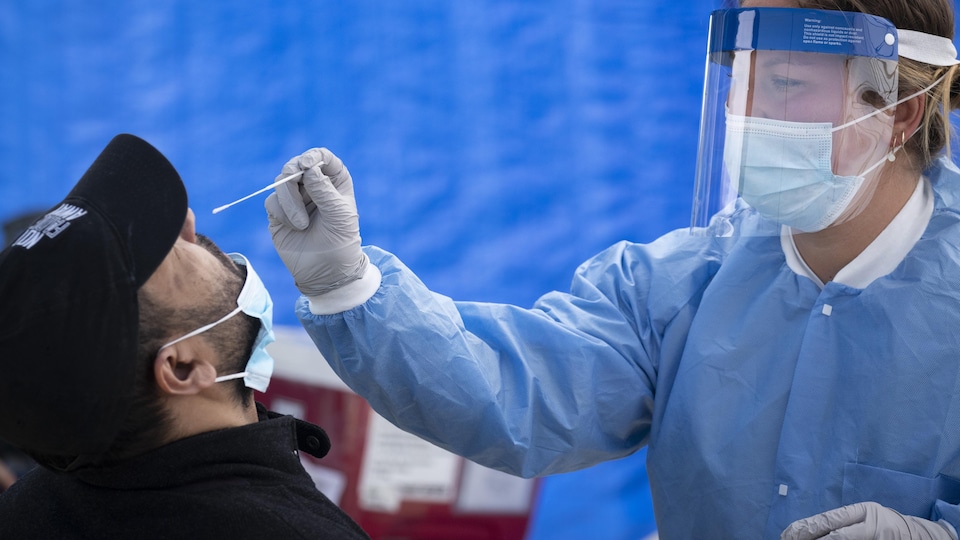
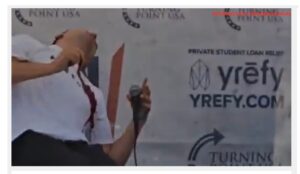
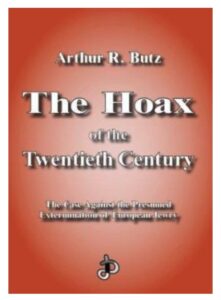
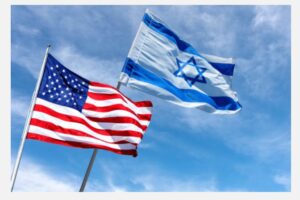
I couldn’t finish it due to Kung Flu fatigue. I’m a bit more focused the election. Man we are getting close to it. Here in fly-over country, you can definitely see the effects of 2,000 Mules etc. with the Colorado Secretary of State Janet Gis-wold. She has made two commercials that make her look desperate. If you have to tell us how secure our election process is, chances are it’s full of holes like Swiss cheese. Her new ad is proud they added more drop boxes. A growing campaign strategy here is they make attack ads that never mention the candidate they are for. So you are left with nothing but a hole. The candidates are so weak, like the one running against “Annie Oakely” Boebert for US Congress. I don’t even remember his name because all his ads say is he’s not Boebert. I always comment on his Face Book ads that “she has bigger balls than yours”. His campaign is so flaccid that the only way he can win is through fraud. This particular race is a litmus test for how fucked we are as a nation
“Red Cross Admits They do Not Separate Vaccinated from Unvaccinated Blood – Mother Claims Baby Died from Blood Clots of Donated Blood”
https://vaccineimpact.com/2022/red-cross-admits-they-do-not-separate-vaccinated-from-unvaccinated-blood-mother-claims-baby-died-from-blood-clots-of-donated-blood/
Go hospital surgery? You have idea if the donor was vaxxed or not. Your transfusion could be your covid jab….that you did not want.
Now a month old baby is dead after surgery. His transfusion was vaxxed blood. The mother is furious at the hospital.
Go to hospital for surgery? You have no idea if the donor was vaxxed or not.*
I can remember when hospitals were places of healing and safety. Today you are never sure you will leave the place alive or further wounded.
My grandmother, a nurse, used to say in 1910 that hospitals were the dirtiest places on earth.